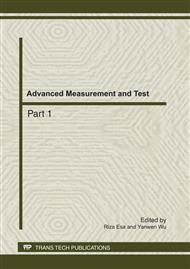p.1133
p.1139
p.1145
p.1151
p.1157
p.1162
p.1166
p.1172
p.1178
High-Speed LMS Algorithm’s Design and Implementation Based on FPGA
Abstract:
This Paper Proposes a Kind of High-Speed Hardware Implementation Method by the Adaptive Equalizer (LMS Equalizer) Based on MSE Criteria. this Design First Makes Full Use of FPGA Internal Hardware on Time-Multiplier (DSP48Es), and Uses the High Throughput of the Streaming Design. then Reoccupy Matlab Software Simulation and Fixed Point Design, Finally Realized ML506 Development Board in Hardware Association Simulation. Experimental Proof, both the Simulation Results Are Consistent, and it Shows that the Proposed Algorithm Is Feasibility and Efficiency, and Has a High Application Value.
Info:
Periodical:
Pages:
1157-1161
Citation:
Online since:
July 2011
Authors:
Price:
Сopyright:
© 2011 Trans Tech Publications Ltd. All Rights Reserved
Share:
Citation:


